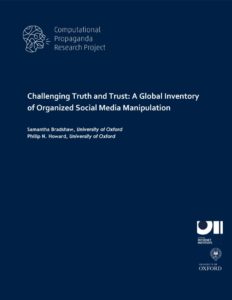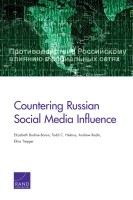 Russia’s disinformation campaign around the 2016 election used every major social media platform, according to reports obtained by The Washington Post before its official release Monday:
Russia’s disinformation campaign around the 2016 election used every major social media platform, according to reports obtained by The Washington Post before its official release Monday:
The report is the first to study the millions of posts provided by major technology firms to the Senate Intelligence Committee, led by Sen. Richard Burr (R-N.C.), its chairman, and Sen. Mark Warner (Va.), its ranking Democrat. The bipartisan panel also released a second independent report studying the 2016 election Monday. Lawmakers said the findings “do not necessarily represent the views” of the panel or its members.
The first report — by Oxford University’s Computational Propaganda Project and Graphika, a network analysis firm — offers new details of how Russians working at the Internet Research Agency, which U.S. officials have charged with criminal offenses for interfering in the 2016 campaign, sliced Americans into key interest groups for targeted messaging. These efforts shifted over time, peaking at key political moments, such as presidential debates or party conventions, the report found….
 The second report — prepared for the Senate Intelligence Committee by researchers for New Knowledge, Columbia University and Canfield Research — emphasized this aspect of the Russian operation, saying, “The IRA created an expansive cross-platform media mirage targeting the Black community, which shared and cross-promoted authentic Black media to create an immersive influence ecosystem.”
The second report — prepared for the Senate Intelligence Committee by researchers for New Knowledge, Columbia University and Canfield Research — emphasized this aspect of the Russian operation, saying, “The IRA created an expansive cross-platform media mirage targeting the Black community, which shared and cross-promoted authentic Black media to create an immersive influence ecosystem.”
Oxford/Graphika said the Russians spread “sensationalist, conspiratorialist, and other forms of junk political news and misinformation to voters across the political spectrum,” Reuters adds.
Social media is transforming the populist far-right in particular, according to analysts and government officials, POLITICO adds.
 “This is a separate ecosystem, with its own rules, its own communities and its own influencers,” said Ben Nimmo, an expert in online disinformation and manipulation at the Atlantic Council’s digital forensic research lab. “What we’re seeing is the internationalization of nationalism.”
“This is a separate ecosystem, with its own rules, its own communities and its own influencers,” said Ben Nimmo, an expert in online disinformation and manipulation at the Atlantic Council’s digital forensic research lab. “What we’re seeing is the internationalization of nationalism.”
Some technical missteps could have helped unmask Russia’s disinformation campaign sooner, according to The Post’s Craig Timberg and Tony Romm. For instance, Russian operatives used rubles to pay for ads and listed Russian phone numbers for contact information, my colleagues reported.“The operatives also left behind technical signatures in computerized logs, such as Internet addresses in St. Petersburg, where the IRA was based,”Craig and Tony wrote.
 Russia is weaponizing technology not just to meddle in elections, but to increase power on the global stage, Axios’ David McCabe and Joe Uchill point out:
Russia is weaponizing technology not just to meddle in elections, but to increase power on the global stage, Axios’ David McCabe and Joe Uchill point out:
- Russia likes to target vulnerable populations (countries with major elections, referendums, civil wars, political controversies).
- These campaigns are easier because of the U.S. government’s lack of unity in confronting the practice and the platforms. That’s a big win for Russia.
- Russia has gotten so much attention that there’s less focus on Iran, where Russia has a big oil alliance — another win for Russia, Axios’ Kim Hart and Sara Fischer note.
Civil society groups are trying to identify the narratives certain societies are vulnerable to, and to identify the weaknesses in institutions that allow disinformation to flourish in one country as opposed to another, the National Endowment for Democracy’s Rodger Potocki told a recent NED forum, Rappler’s Vernise L. Tantuco writes.
After the talk, Wilson Center Global Fellow at the Kennan Institute Nina Jankowicz responded to a question about indicators that a society could be susceptible to disinformation, she adds:
- Trust in institutions, she said, was a big factor in susceptibility to disinformation, though it’s difficult to measure.
- The lack of “vibrancy of the media sphere” is one reason why the US has fallen victim to disinformation.
- “Our media sphere is kind of atrophying, particularly at the local level, which I view as the connective tissue between people, for instance, in America’s heartland and our government in Washington,” she said.
- Media literacy is another factor, and it goes beyond reading an article and understanding it. It’s important, she said, that people also understand ownership of media companies, media transparency, and how the editorial process works.
Digital Democracy Specialist
International Republican Institute
Brussels, Belgium







